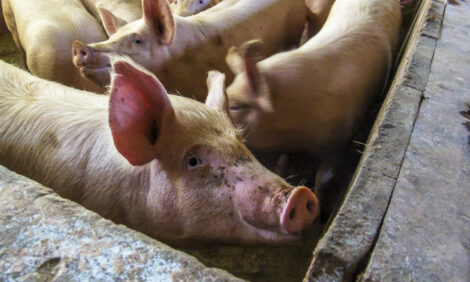



Flexible penning aids weaner trials
UK - A flexible penning arrangement in a new weaner house at Newcastle University's Cockle Park Farm is helping with trials into the effects of lactation treatments and the removal of antimicrobial growth promoters from weaner diets.
|
Put up to replace an ageing flat-deck container unit, when configured in a normal commercial layout, it has six rooms off a full length side passage, each with four pens holding up to 20 pigs from four weeks old to 9 1/2 weeks - between about 7 and 25 kg. However, special stainless steel fittings on the Panelplus plastic panel divisions which attach to the back wall and pen fronts enable the pen geometry to be varied.
Each room can be divided in different ways to hold smaller groups for trial work. This allows matched contemporary batches of two x 20, four x 10 or six x 6 pigs to be formed for such work as diet comparison or to keep litter groups intact to look at residual effects of lactation treatments.
Apart from giving flexibility needed for research by allowing different group sizes, the design allows good environmental control and easy handling and weighing of pigs and feed.
"We needed a more welfare- and labour-friendly environment as the number of trials on weaned pigs from our 200-sow herd increased," commented Mr Alan Hastie, the pig unit manager. "We wanted something smart, durable and easy-to-clean and Tony Chapman, our design consultant, recommended the Panelplus panels, supplied by TFS Ltd. The pigs' growth rates, feed conversion and health were good before, but now we have less handling and stress.
 |
| Hygienic plastic Panelplus panels allow weaner pen geometry to be varied at Newcastle University. |
The building from ARM Buildings, also has washable, bonded insulation panels for the walls and roof and Dicam controlled heating and ventilation systems in each room.
"At a time when pig research facilities at many centres are being reduced, I am delighted that we have a new building which will enable us to address questions of key importance for the industry. It is vital that farmers are able to maintain economic efficiency while adapting to the removal of antimicrobial growth promoters," said Sandra Edwards, Professor of Agriculture at Newcastle University.
For further information contact:
| Professor Sandra Edwards 0191 222 8350 (Newcastle University) |
Jeremy Skipper 01572 813020 (TFS Limited) |
Martin Looker 01473 823842 (BHR Communications) |
Source: BHR communications on behalf of TFS Limited and Newcastle University - 5th March 2004













